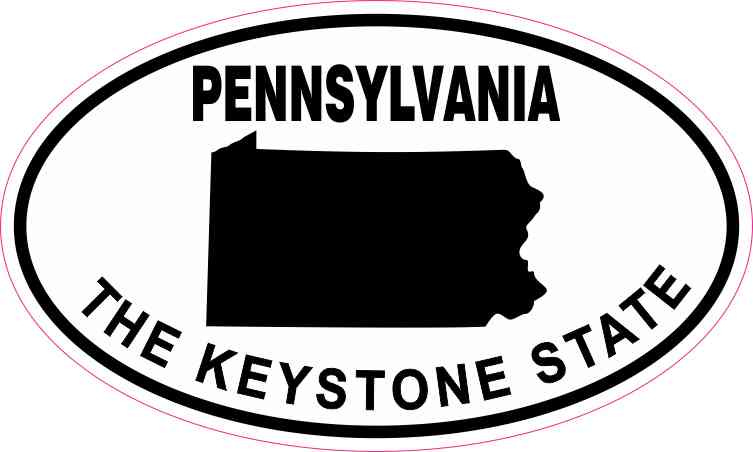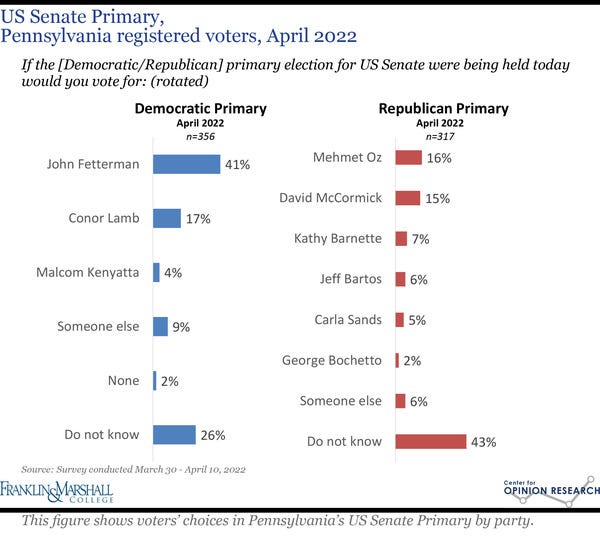A Pivotal Election for U.S. Senate in Pennsylvania
Primary election campaigns could offer important harbingers of the futures of both parties
With less than a month to go in Pennsylvania’s May 17th primary election, a few interesting battles have shaped up within both the Democratic and Republican state parties over who will fill the seat left open when Republican Senator Pat Toomey steps down at the end of his term early next year.
Watch the debates between the candidates in both parties over the next few weeks – they could offer important omens for what’s to come not just in Pennsylvania but also across the country.
Big stakes in the race for this Senate seat
The fight to win the nomination within both parties is important for two main reasons. First, it will offer some signals about the possible future trajectories of both parties, in large part because Pennsylvania voters living in the Keystone State can shift in unpredictable directions that can offer leading indicators about broader national political trends.
Second, the candidate who wins the general election in November could, depending on how other Senate races shake out, be the one that shifts the entire balance of power in the U.S. Senate. Democrats currently hold a razor thin margin (50 senators in the Democratic caucus plus Vice President Harris casting the tie breaking vote versus 50 Republicans). The victor of this Senate seat in Pennsylvania could determine the course of Biden’s presidency for the next two years.
The current state of play in the race
There are large number of candidates running for the seat in both parties, but the race has largely come down to two leading candidates (Trump-endorsed celebrity doctor Mehmet Oz and former hedge fund CEO Dave McCormick) on the Republican side and three top contenders (Lt. Governor John Fetterman, Rep. Conor Lamb, and state Rep. Malcolm Kenyatta) on the Democratic side.
1. Many undecided voters up for grabs. The biggest data point in the race right now is the large number of undecided voters in both the Republican and Democratic primaries just a few weeks before the election. A recent poll conducted by Franklin & Marshall College in Lancaster, Pennsylvania from March 30 to April 10, 2022 found large numbers of undecided voters:
More than 4 in 10 (43%) Republican voters say they are not sure who they will vote for in the Senate race, with two-thirds (66%) of those who have chosen a candidate saying they could still change their minds.
On the Democratic side, about a third of the voters are undecided (26%) or favor someone other than the candidates on offer (9%), and nearly half (47%) who have chosen a candidate say they could still change their minds.
2. The contours of a “change” election are in place. There is strong voter dissatisfaction with the current situation in the state and America.
President Joe Biden’s job ratings are low, with only one in three (33%) registered voters in the state saying he is doing an excellent or good job as president.
Only 29% of voters say the state is headed in the right direction, and 74% say its heading in the wrong direction.
3. Economic concerns are top of mind. Unemployment, personal finances, and concerns about the economy are the most mentioned problems facing the state, followed by discontent with government and political leaders.
The main event in the GOP: How much will the Trump effect matter?
The two candidates that have received the most attention are television celebrity doctor Mehmet Oz and former hedge fund manager David McCormick. The Franklin & Marshall poll, conducted mostly before former President Donald Trump endorsed Oz earlier this month, found the race to be a toss-up with Oz getting 16% and McCormick at 15% among Republican voters.
It remains unclear how much Trump’s endorsement might matter to Republican voters in Pennsylvania – the former president so far has a very mixed record in picking candidates, and he lost the state to Biden in the 2020 presidential election by a wider margin than he won it in 2016.
Both McCormick and Oz have a similar advantage that none of the Democratic candidates have right now – significant personal wealth. Dr. Oz’s personal net worth is anywhere from $76 million to $300 million, and McCormick’s net worth is between $116 million and $290 million. Both men have used their own resources to fund their campaigns so far to the tune of millions of dollars, and they are also backed by various GOP donors and political action committees, too.
The interesting feature about this head-to-head GOP contest is that thus far it’s largely not been focused on issues but rather a contrast of the personality profiles and the wealth of both men, but that may change with debates coming up that include other candidates in the race including political commentator Kathy Barnette, businessman Jeff Bartos, and Carla Sands, a former U.S. ambassador to Denmark under Trump.
With so many undecided voters on the Republican side, a lot could shift in the next few weeks.
Democrats: An interesting repositioning underway
The top three candidates on the Democratic side met in a televised debate last night. Heading into the debate, the apparent frontrunner was John Fetterman, the lieutenant governor who led the rest of the field by double digits. In the Franklin and Marshall poll, Fetterman garnered 41% over Congressman Conor Lamb with 17%, and with state representative Malcolm Kenyatta at 4%.
Fetterman has a huge fundraising advantage over the other candidates, and he has burnished his image as an outsider.
Last night’s debate featured Lamb and Kenyatta taking aim at the frontrunner Fetterman on his record and positions, but it remains unclear whether attacks these left a mark. The key issues that have come up in the campaign so far include:
Immigration – Both Fetterman and Lamb distanced themselves from Biden’s current approach on immigration and said they support extending Title 42, a policy for the quick expulsion of migrants at the border without giving them a chance to seek asylum. Both Fetterman and Lamb said that this policy should remain in place until the pandemic is over, whereas Kenyatta called for an end to the policy, in line with the Biden administration’s current plan.
Mask mandates – The city of Philadelphia reimposed a mask mandate this week, only to rescind it during the debate – and Fetterman and Kenyatta opposed a mask mandate, with Lamb supporting it.
Crime – With murder and crime rates rising, all three candidates have supported strong gun control measures. Given the recent crime wave, there is very little talk about “defunding the police” in Pennsylvania this cycle.
All three candidates express support Biden and his agenda, including the stalled Build Back Better efforts – an interesting bet at a time and in a state where Biden is deeply unpopular. Given the dominance of economic and inflation concerns, it will be interesting to watch which of the candidates can distinguish themselves on the economic issues.
On these issues as well as some other questions like foreign policy including Ukraine and Israel, look for the candidates to try to differentiate themselves from each other and the Republican field as the primary election date moves close.
In politics, a lot can happen in a few weeks, and the shape of the both primary fights are still their early stages – but watch what happens inside both parties in this Senate race for a possible preview of coming attractions in U.S. politics in 2023 and beyond.




